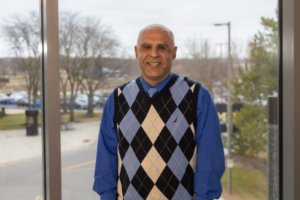
How do rational people discuss the economy, inflation, de-industrialization, labor unions, and profits today? “While we can each form our own opinions from reading and consuming the literature from the experts, it seems there are many experts defending positions that are unique and contradict one another,” according to UM-Flint undergraduate student Luís Martinez. They are working, with guidance from associate professor of economics Adam Lutzker, on a research project aimed at shedding some light on those various models, where they come from, and their assumptions and biases.
Martinez started out aiming their Diversity, Equity, and Inclusion / Racial, Economic, & Environmental Justice research project towards the Starbucks unionization and considering the way unions impact things like inflation. As the project progressed, however, Martinez found that even when you zoom in on a cross-section like unions and inflation, there are multiple ‘economic schools of thought’ which each bring their own incomplete model to the examination. This has led Martinez to shift focus and survey current economic theory as it relates to the topic.
They are addressing this problem by creating a pamphlet of comparative macro-economic theory to help shed light on the various models, what they focus on and what their weaknesses are. They are also doing some community-engaged research and examining some of the ways local UAW chapters are restructuring their internal election processes as well as looking into some of the food co-op structures that are maturing in Flint’s north side neighborhoods.
Our limited research and computation ability up until this point, or some point possibly in the near future, has created this condition where even researchers have to make choices in what we focus on and what we have to leave out. Essayist Anais Nin has said, “We don’t see things as they are; we see them as we are.” Quite naturally, this leads many theorists and schools to create models that fit the world from their point of view.

To this, Martinez adds, “any ‘social truth’ that tries to mask itself as the ‘natural and ultimate truth’ is quite troublesome in determining a social impact. There are some economic understandings that tend to make such claims.”
As co-founder of the Center for Applied Rationality Julia Galef has said, ‘let’s really understand as precisely as we can what our models are, and where they diverge from each other and why they diverge. And so the goal is framed as understanding the landscape of the different models and not as shifting someone’s opinion.” Martinez is answering Galef’s call in regard to economic philosophy.
“With the way economics is presented, especially in my experience of learning it since high school,” Martinez says, “I’ve been exposed to lots of these ‘definitive principles,’ but I had trouble understanding where these principles come from and what was the theoretical underpinning to reach them. It wasn’t until a broad study of each of them that things really started to click.”
In their analysis of Flint, they are beginning to engage with folks in the community to examine some of the ways that these theories are interacting with each other in the real world. Luis is initiating conversations with folks involved in some of the co-op endeavors on the north side of Flint, UAW leadership about their internal transition to a democratic leadership selection process from their old system of appointments, and looking into other ways that we are grinding out the values decisions between Chicago-school laissez faire theories and some of the leftist heterodoxy present in 21st century Michigan.
When it comes to understanding what has happened to Flint and advocating for economic justice, all sides of the issue matter not just the perspectives of corporate leaders or blue collar workers.





